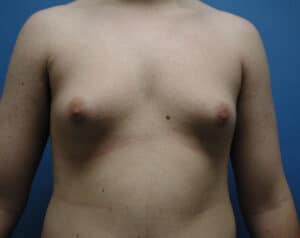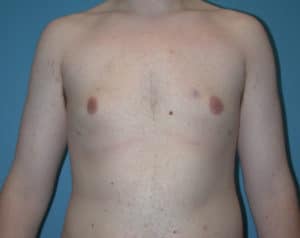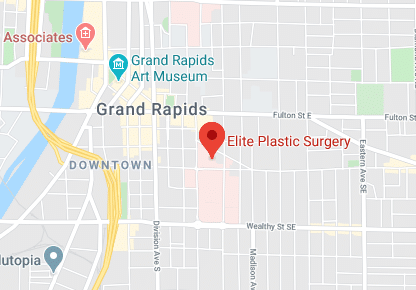At Elite Plastic Surgery, our experienced physicians offer comprehensive Gynecomastia treatments for patients in Grand Rapids and the surrounding areas of Michigan. Our office can answer any questions you have and help you create a customized treatment plan. Call (616) 459-1907 today to schedule your consultation!
What is Gynecomastia?
Men sometimes develop excess tissue in the breasts. Clinically, this is called gynecomastia. Most men don’t think of the condition as anything more than having some extra weight and it showing in their breasts. Gynecomastia occurs in as many as 40 – 60% of men. This can make a man consciously avoid situations where he has to remove his shirt such as at the beach or when out on a boat. This condition can cause extreme embarrassment, social inhibition, and self-consciousness for boys and men who suffer from it.
Male Breast Reduction Before & After Photos

*Individual results may vary
View more before & after photos
Causes Of Gynecomastia
The causes of breast enlargement in men are not fully understood, but the incidence increases with certain drugs (digitalis, anabolic steroids, tagamet, and spironolactone), use of marijuana or alcohol, and obesity. The condition is prevalent in pubescent boys, with up to 70% having it to some degree, due to elevated estrogen and testosterone levels during those years. Teenage gynecomastia usually goes away as hormone levels return to normal after puberty.
For middle-aged men, hormones can also be involved due to fluctuations that accompany normal aging. Drug use can also be a factor. Certain medicines are more often the cause of male breast enlargement.
Taking these medicines can trigger the condition:
- Certain antibiotics
- AIDS treatment drugs
- Steroids
- Anti-anxiety medicines
- Anti-depressants
- Heartburn-reducing drugs
What is Male Breast Reduction?
Many men may feel like they need to live with gynecomastia, but the plastic surgeons at Elite Plastic Surgery can perform male breast reduction, giving them back their self-esteem and confidence.
This procedure is designed to restore a more masculine appearance to the male chest, using a combination of breast tissue removal and liposuction to improve chest wall contour. The result is a flatter, firmer and more masculine-looking chest.
Is gynecomastia surgery permanent?
Patients wonder if this surgery will need repeating in the future. True gynecomastia, versus enlarged breasts due to weight gain or other lifestyle factors, is caused mainly by excess glandular tissue. This causes the protrusion of the nipple-areola complex. In male breast reduction surgery, your Elite Plastic Surgery surgeon removes most of the mammary gland, leaving enough to support the nipple-areola. With this tissue gone, the chances of recurrence are very low.
However, if the gynecomastia was due to the use of steroids, marijuana, or other medications, it is possible for a patient’s breasts to become enlarged again if usage is continued. Also, a sizeable increase in weight can allow fat to accumulate in the breasts, although this isn’t true gynecomastia.
If you want to maintain your new chest contours, keeping to a healthy weight, and moderating your alcohol or marijuana use is the way to do it. Steroid use would fully need to cease, as enlarged breasts are a direct side effect.
Is recovery from male breast reduction painful?
These are not overly painful recoveries by any means. If we’re only using liposuction to remove excess fatty tissue, the incisions are very short. Removing glandular tissue and any excess skin will create longer incisions. Regardless, patients find the recovery discomfort easily manageable with the use of prescription pain medication (usually only for the first one or two days) and then switching to over-the-counter pain medication options.
What do I need to do to prepare for gynecomastia surgery?
Although relatively minor, this is still surgery, so you’ll need to make the same preparations as you would with any surgery. You’ll stop taking blood thinners, anti-inflammatory medications, aspirin, and most supplements for one week prior to your procedure at Elite. If you smoke, you’ll need to stop for two weeks prior to and following your surgery, as smoking constricts the blood vessels and can impede healing.
If your job involves moderate to heavy lifting, you’ll need to make arrangements to be excused from this for about six weeks during your recovery.
How long does breast reduction surgery take?
These are not complicated procedures, lasting between 1.5 and 2 hours.
What will my scarring be like after this surgery?
A great thing about gynecomastia surgery is that scarring is minimal. Our surgeons use tiny incisions to introduce the cannula to suction away the accumulated fat around your breasts. These incisions are usually made around the areolae, and they are basically invisible just a few weeks after your surgery. If you need to have the more involved surgery to remove the glandular mass, along with some excess skin, there will be some scarring. It also is relatively minimal. Our patients feel the minor scarring is well worth the change in the contours of their chest.
When can I get back to my normal activities after breast reduction surgery?
During our consultations for male breast reduction, we often hear fears of a lengthy recovery and absence from things such as sports or exercise. Those misconceptions can keep some patients from getting this surgery, which is unfortunate.
After the first week or two at most, patients can return to light exercise, such as walking. Strenuous exercise needs to wait for a month or so. But you’ll quickly be able to return to work and regular activities. Any exercise, such as weight training that targets the chest, will likely need to be avoided for up to six weeks.
Does insurance cover male breast reduction surgery?
If your condition is due to true gynecomastia, insurance may cover it. This can vary with different carriers, however. We work with both your doctor and your insurance company to verify the presence of excess glandular tissue and the need for surgery.
Candidates for Male Breast Reduction Surgery

Is Gynecomastia Common?
According to studies, gynecomastia is quite common. It is believed that up to 70 percent of adolescent boys develop the condition. Most of these cases resolve as the boy reaches physical maturity and his hormones come into regulation. Middle-aged and senior men also have high instances of gynecomastia, approximately 65 percent. While the underlying cause is often hormone dysregulation, resolving this condition is more challenging in adult men.
Are There Medical Reasons for Operating on Gynecomastia?
In most cases, the reason for treating gynecomastia is to resolve the cosmetic consequences of this condition. Men who have true gynecomastia cannot get rid of their enlarged breasts without surgery, and the appearance of their breasts can cause an immense amount of emotional suffering. So, while gynecomastia is typically not associated with disease like breast cancer, there are very good reasons for seeking the care of a qualified plastic surgeon.
Can Gynecomastia Develop from the Use of a Testosterone Patch?
Gynecomastia is related to estrogen. This is the sex hormone that is primarily related to women, but men have it, too. Testosterone is involved in gynecomastia in that, when levels drop too low, the body may then make or store more estrogen/estradiol.
Can Drugs Other Than Steroids Cause Gynecomastia?
Yes. There are a number of different types of drugs that may contribute to the development or persistence of gynecomastia. Examples include:
- Marijuana
- Heroin
- Cardiovascular medications
- Medications for the treatment of ulcers
- Prostate cancer medications
- Some antibiotics
- Some antidepressants
Does the Tissue Look Like Women’s Breast Tissue?
Male breast tissue is made up of fat, just like female breast tissue. Therefore, the tissue itself can look like women’s breast tissue. However, it is only in severe cases that the entire breast shape looks like a female breast. Most cases of gynecomastia involve puffiness around the nipples and mild to moderate breast enlargement.
Why Would a Pathologist Look at Gynecomastia Tissue? Is This a Type of Cancer?
Gynecomastia most often occurs completely separate from male breast cancer. It is not an indication that a man has breast cancer or has a higher risk of developing the disease. When you consult with your primary care physician or a plastic surgeon about unusual breast enlargement, you can expect a thorough consultation, medical history review, and possibly a mammogram. This is especially common in men over age 40, since this is the life stage in which breast cancer risk is higher.
Your doctor who routinely treats gynecomastia understands the characteristics of benign breast tissue as compared to breast cancers. Typically, breast cancer tumors are hard and irregular. The lump may be tender or painful. To accurately diagnose gynecomastia and rule out breast cancer, the doctor may take a biopsy of tissue and send it to the lab for a pathology examination.
Treatment For Gynecomastia
Most cases of gynecomastia goes away with time without other additional treatment. If gynecomastia is caused by other underlying medical conditions, treatment options are available to help.
For adolescents that do not have any apparent cause of gynecomastia, our doctors will suggest re-evaluations every three to six months to see if the condition improves by itself. Gynecomastia typically goes away by itself without treatment in less than two years. Treatment may be necessary if the condition does not improve on its own or if it starts to cause significant pain, tenderness or embarrassment.
If gynecomastia does not improve and becomes bothersome despite initial treatment or observation, our specialists may advise surgery. Two gynecomastia treatment options include:
- Liposuction: This surgery removes breast fat, but not the breast gland tissue itself.
- Mastectomy: This type of surgery removes the breast gland tissue. Surgeons typically perform this endoscopically, using only small incisions. This less invasive type of surgery involves less recovery time.
Results Of Gynecomastia Surgery
The final results of gynecomastia surgery are permanent in many cases. However, if gynecomastia resulted from the use of certain prescription medications, drugs (including steroids), or weight gain you must be fully free from these substances and remain at a stable weight in order to maintain your results.
Patient Testimonial
“Very friendly and empathetic staff, professional and courteous, prompt & efficient yet not rushed. Various treatment options presented, not pushy to treat issue as to what doctor wants, more interested in treatment that patient feels best for the patient needs & wishes. Carpel surgery on wrist soon, I’m in good hands!! ???????? ????????” – D. Jones
Read more patient testimonials here!
Male Breast Reduction Recovery
During your recovery, your surgeon will cover your wounds with dressings or bandages. An elastic bandage or support garment may be used to minimize swelling as it heals after surgery. This will also help support your new chest contour. For more information about post operative instructions, click here!
Risks of Gynecomastia Surgery
Risks of male breast reduction surgery include:
- Bleeding
- Changes in nipple or breast sensation
- Fluid accumulation
- Scarring
Book Your Gynecomastia Consultation In Grand Rapids!
If you’re considering a male breast reduction and would like more information, contact our Grand Rapids office today! Call (866) 331-0612 to schedule a consultation with one of our plastic surgeons.


